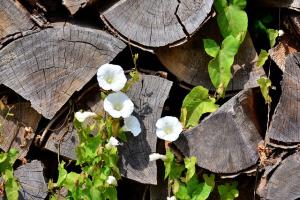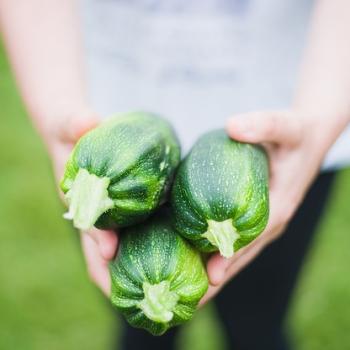
This evening, I went to the community garden for the last time.
Everything in the garden was exactly where it had been left last year. Nothing had moved. A stack of bagged compost still stood by the front gate, covered in plastic, untouched. The black gardener’s cloth was all ripped up in a pile except where I’d weighed it down with bricks. The tools somebody brought were left on the ground, rusted. Rotted wreckage of last year’s plants stuck up from the ground here and there. The planters I’d used to grow potatoes were on their sides, filled with rainwater. Every single raised bed was filled from one end to the other with bindweed, wild mustard and dandelions.
The wild mustard and dandelions covered the ground as well, nearly as high as my knees. It had rained all day, and my jeans were soaked as I slogged through.
In 2022, when I was still being stalked by my menacing neighbor and couldn’t go into my own backyard, I was excited to help at the community garden. The community garden was the project that took up my whole summer, in between visiting Columbus and helping The Lost Girl. I kept the place weeded, and filled six of the eight beds of compost myself. The other gardeners tended their own garden beds. Nobody set up the rain barrels or did any work on the property itself. The neighbors asked if someone would come take care of the poison ivy that was encroaching on the alley, but nobody did. They just hired a mower to come and buzz everything down to the ground at the end of the season.
In 2023, just after finding out the stalking neighbor was dead and after the fiasco which ended my relationship with the lost girl, I was added to a group chat where I was supposed to help plan the garden with several other people. I was told there’d be a budget to fix it up so it didn’t get overgrown again. I was told I should start making plans for that. I went to the garden stores all over town, photographed price tags, and made a plan. I showed the plan to the lady in charge. She said “I think we’ll just work on the front of the garden this year!” and insisted on letting the back grow up feral again. I tried to coordinate in the group chat with the other gardeners, but only one other person showed up to help me get things done. She was very helpful and I’m thankful to her, but we two couldn’t do it on our own. By late summer, the pokeberry was taller than I was. There were noxious weeds from one end of the garden to the other. We couldn’t see to pick the squash bugs off or dig the larvae out of the squash plants, so the zucchini and pumpkins were destroyed. The few gardeners still trying to grow anything there eventually couldn’t even reach their crops. And I was the one who felt guilty.
A neighbor volunteered to mow the garden just to be nice, and it took him two whole days of work. He whacked down the poke with his machete and buzzed down the tall grass. He even cut down the poison ivy, at great personal risk, just because he wanted to help. A week later, his family told me that nobody who ran the garden had thanked him or reached out to him at all, and they were offended. I told them I was sorry. I thanked them myself. I didn’t know what to say. It wasn’t my garden; I was just trying to help. But somehow, the whole thing felt like my fault. I felt guilty again.
In the fall, the lady in charge of the garden messaged me on Facebook to complain about how bad the garden looked and how disappointing it was that all the rolls of cloth she’d bought to put down were spoiled, because someone hadn’t put them down properly. She’d been in Austria for most of the summer. I hadn’t seen her at the garden since May. I put the cloth down myself, without instruction, even though it wasn’t working no matter how hard I tried to get it right. But again, it felt like my fault.
I didn’t go back to the garden to weed my raised beds or help put it to bed for the year. I was too hurt.
I was hurt all winter. I’ve been hurt all this spring. I’m hurting now.
That was why it took me until May of this year to go back to the garden, push open the rusted gate, and take back my tomato cages.
I’d shoved those cages very firmly into the soil last year so they wouldn’t fall over. They came out of the soil with difficulty, because the bindweed was clinging to them. One of them broke a little in my hand as I yanked and tugged, imagining they were teeth. I picked up the plastic whiskey barrel planter I’d left in the garden, and my little rectangular planters as well. I excavated a few of the wild mustard plants and found the colorful pinwheels I’d used to scare the birds away from my sunflower seeds. I stuffed them all into my freshly vacuumed car, where they left quite a muddy smear.
I felt that hurt again. Shame at giving up. Shame as if it was all my fault. Shame that I was so selfish I was giving up on the community, taking my things and going home. Shame, and also anger. And then more shame, because I shouldn’t be angry. I was the one who got myself into this mess, after all.
I thought again about The Lost Girl and her children. I remembered how it felt in the winter and spring of 2023, when my mental health was the worst it had ever been in my life, when her abusive partner had returned and she was manipulating me for money and things were spinning out of control.
I found myself sitting in my car in front of a ruined, derelict vacant lot with a sign claiming it was a community garden on the fence– angry, hurt, on the verge of tears, as the drizzle turned to real rain and the sun set over LaBelle.
How do I get myself into situations like this?
I believe in being helpful. I believe in being helpful to a fault. I believe that most of the everyday work of Christianity involves being attentive to the needs of your neighbors and helping them even if it kills you. But I have never learned the difference between being helpful and being codependent.
I think that one of the biggest differences between a healthy religious practice and the toxic, cult-like Christianity that has ruined me, is that healthy religion teaches you to be helpful and attentive to others, and cults groom you to be codependent.
I think the difference between virtue and sin has something to do with the difference between generosity and codependency, but I don’t know what it is.
If I am ever to find a real Christianity, and really serve Christ, and become the real saint that I want to become instead of whatever it is I am, I’m going to have to learn the difference between being helpful and being codependent.
I wish I had more organized thoughts on the subject, but I don’t just now. All I have for my readers is this resolution: I’m going to work to discover the difference, and I’m going to tell you about it as I go along.
I’m going to plant a wonderful garden here in my yard. I’m going to grow tomatoes and zucchini, peas and onions, ground cherries and bush watermelons, herbs and sunflowers. I’m going to find ways to help people as well, things I can do without making everything worse.
I drove away from the garden– sad, angry, hurt, but also satisfied.
I think it’s going to be a good summer.
We’ll see where we go from here.
Mary Pezzulo is the author of Meditations on the Way of the Cross, The Sorrows and Joys of Mary, and Stumbling into Grace: How We Meet God in Tiny Works of Mercy.













